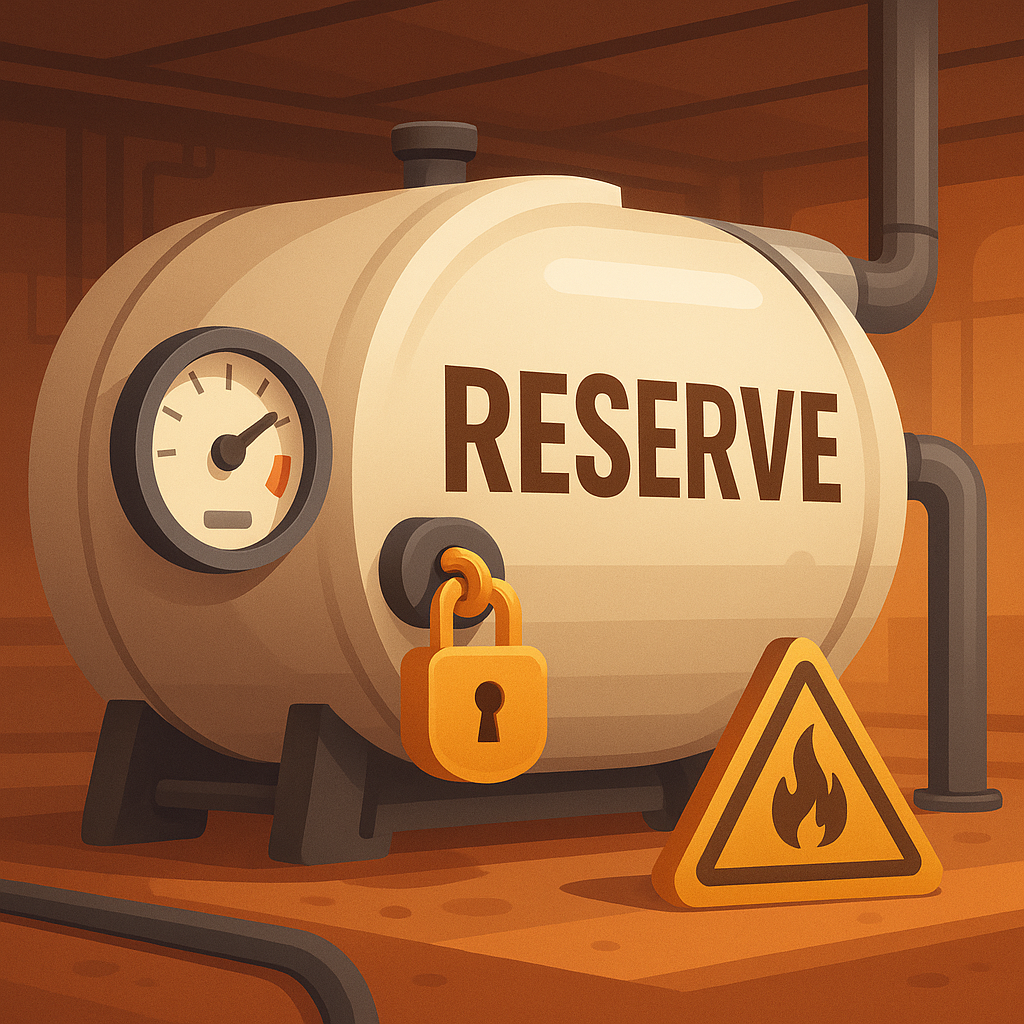Reserve
Definition
The term "reserve" describes the act of keeping something for future use or a supply set aside for specific purposes. It can also refer to a degree of formality or restraint in behavior.
Parts of Speech
- Verb
- Noun
Pronunciation
American English
- IPA Pronunciation: /rɪˈzɜːrv/
- Respelling: ri-ZURV
British English
- IPA Pronunciation: /rɪˈzɜːv/
- Respelling: ri-ZURV
Etymology
The word "reserve" originates from the Latin "reservare," meaning "to keep back," derived from "re-" (back) and "servare" (to save or keep). It entered Middle English via Old French "reserver."
Derivatives
- Reserved (adjective)
- Reservable (adjective)
- Reservoir (noun)
- Reserver (noun)
- Reservation (noun)
Synonyms
- Set aside
- Save
- Stock
Antonyms
- Use
- Spend
- Exhaust
Usage
The term "reserve" is used in contexts such as resource management, hospitality, and personal behavior. For example, "They reserved a table at the restaurant" (verb) or "The emergency fund serves as a financial reserve" (noun).
Related Terms
- Stockpile: A large accumulated supply of something.
- Allocation: The distribution of resources for specific purposes.
- Conservation: The act of preserving or protecting something.
Detailed Definitions
Verb
- To set aside for future use: Refers to keeping something for a particular purpose or time.
- Example: "She reserved a portion of her salary for savings."
- To arrange for the use of something in advance: Refers to booking or securing something beforehand.
- Example: "We reserved seats for the evening show."
Noun
- A supply or resource kept for future use: Refers to something stored for emergencies or specific needs.
- Example: "The company maintains a fuel reserve for critical operations."
- Formality or restraint in behavior: Refers to maintaining a degree of modesty or control.
- Example: "He spoke with a sense of reserve, carefully choosing his words."
- An area designated for specific use: Refers to protected areas, often for wildlife or cultural purposes.
- Example: "The national park includes a wildlife reserve."
reserve



🇨🇳 Chinese (Mandarin)
- 预定 (yùdìng) - To reserve (a seat, for example)
- IPA: /y˨˩˦ tiŋ˥˩/
- Respelling: yu-ding
- 储备 (chǔbèi) - Stock, reserve
- IPA: /ʈʂʰu˨˩˦ bei˥˩/
- Respelling: chu-bei
🇮🇳 Hindi
- आरक्षित करना (ārakṣit karnā) - To reserve
- IPA: /aːɾəkʂɪt̪ kəɾnaː/
- Respelling: a-ra-kshit kar-na
- संचित (sañcit) - Stock, reserve
- IPA: /sʌnt͡ʃɪt̪/
- Respelling: san-chit
🇪🇸 Spanish
- Reservar - To reserve
- IPA: /reseɾˈβar/
- Respelling: re-ser-var
- Reserva - Stock, reserve
- IPA: /reˈserβa/
- Respelling: re-ser-va
🇫🇷 French
- Réserver - To reserve
- IPA: /ʁezeʁve/
- Respelling: re-zer-ve
- Réserve - Stock, reserve
- IPA: /ʁezɛʁv/
- Respelling: re-zer-v
🇸🇦 Arabic (Modern Standard Arabic)
- حجز (ḥajz) - To reserve
- IPA: /ħaʤz/
- Respelling: ha-jz
- احتياط (iḥtiyāṭ) - Stock, reserve
- IPA: /iħtijaːt/
- Respelling: ih-ti-yat
🇧🇩 Bengali
- সংরক্ষণ করা (sôngrokṣoṇ kôrā) - To reserve
- IPA: /ʃɔŋroʃɔn kora/
- Respelling: song-rok-shon ko-ra
- সংচয় (sôngcôẏ) - Stock, reserve
- IPA: /ʃɔŋtʃɔj/
- Respelling: song-choy
🇷🇺 Russian
- Зарезервировать (Zarezervirovat') - To reserve
- IPA: /zərʲɪzʲɪrvʲɪˈrovatʲ/
- Respelling: za-re-zer-vi-ro-vat
- Резерв (Rezerv) - Stock, reserve
- IPA: /rʲɪˈzʲɛrf/
- Respelling: re-zerv
🇵🇹 Portuguese
- Reservar - To reserve
- IPA: /ʁɨzɨɾˈvaɾ/
- Respelling: re-zi-var
- Reserva - Stock, reserve
- IPA: /ʁɨˈzɛɾvɐ/
- Respelling: re-zerv-a
🇮🇩 Indonesian
- Memesan - To reserve
- IPA: /məˈpəsan/
- Respelling: me-pe-san
- Cadangan - Stock, reserve
- IPA: /t͡ʃaˈdaŋan/
- Respelling: cha-dan-gan
🇩🇪 German
- Reservieren - To reserve
- IPA: /ʁezeʁˈviːʁən/
- Respelling: re-zer-vee-ren
- Reserve - Stock, reserve
- IPA: /ʁeˈzɛʁvə/
- Respelling: re-zer-ve
🇯🇵 Japanese
- 予約する (Yoyaku suru) - To reserve
- IPA: /jo.ja.ku su.ɾɯ/
- Respelling: yo-ya-ku su-ru
- 予備 (Yobi) - Stock, reserve
- IPA: /jo.bi/
- Respelling: yo-bi
🇻🇳 Vietnamese
- Đặt trước - To reserve
- IPA: /ɗə˨˩ʔ twə˧˩/
- Respelling: dat truoc
- Dự trữ - Stock, reserve
- IPA: /zɨ˩˧ ʈʂu˨˩/
- Respelling: zu tru
🇰🇷 Korean
- 예약하다 (yeyakada) - To reserve
- IPA: /jʌ.ja.kʰa.da/
- Respelling: ye-ya-ka-da
- 예비 (yebi) - Stock, reserve
- IPA: /jʌ.bi/
- Respelling: ye-bi
🇹🇷 Turkish
- Ayırmak - To reserve
- IPA: /ajɯɾˈmak/
- Respelling: a-yir-mak
- Rezerv - Stock, reserve
- IPA: /ɾeˈzeɾv/
- Respelling: re-zer-v
🇵🇰 Urdu
- محفوظ کرنا (Mahfooz karna) - To reserve
- IPA: /mɛhfuːz kəɾnɑː/
- Respelling: meh-fooz kar-na
- ذخیرہ (Zakhira) - Stock, reserve
- IPA: /zəxiːɾaː/
- Respelling: za-khi-ra





